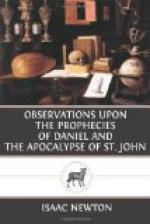The Bishop of Ravenna, the Metropolis of Flaminia and AEmilia, was also subject to the Pope: for Zosimus, A.C. 417, excommunicated some of the Presbyters of that Church, and wrote a commonitory Epistle about them to the Clergy of that Church as a branch of the Roman Church: In sua, saith he, hoc est, in Ecclesia nostra Romana. When those of Ravenna, having elected a new Bishop, gave notice thereof to Pope Sixtus, the Pope set him aside, and [14] ordained Peter Chrysologus in his room. Chrysologus in his Epistle to Eutyches, extant in the Acts of the Council of Chalcedon, wrote thus: Nos pro studio pacis & fidei, extra consensum Romanae civitatis Episcopi, causas fidei audire non possumus. Pope Leo I. being consulted by Leo Bishop of Ravenna about some questions, answered him by a decretal Epistle A.C. 451. And Pope Gregory the great, [15] reprehending John Bishop of Ravenna about the use of the Pallium, tells him of a Precept of one of his Predecessors, Pope John, commanding that all the Privileges formerly granted to the Bishop and Church of Ravenna should be kept: to this John returned a submissive answer; and after his death Pope Gregory ordered a visitation of the Church of Ravenna, confirmed the privileges heretofore granted them, and sent his Pallium, as of antient custom, to their new Bishop Marinian. Yet this Church revolted sometimes from the Church of Rome, but returned again to its obedience.
The rest of Italy, with the Islands adjacent, containing the suburbicarian regions, or ten Provinces under the temporal Vicar of Rome, viz. 1_Campania_, 2_Tuscia_ and Umbria, 3_Picenum suburbicarium_, 4_Sicily_, 5_Apulia_ and Calabria, 6_Brutii_ and Lucania, 7_Samnium_, 8_Sardinia_, 9_Corsica_, and 10_Valeria_, constituted the proper Province of the Bishop of Rome. For the Council of Nice in their fifth Canon ordained that Councils should be held every spring and autumn in every Province; and according to this Canon, the Bishops of this Province met at Rome every half year. In this sense Pope Leo I. applied this Canon to Rome, in a decretal Epistle to the Bishops of Sicily, written Alippio & Ardabure Coss. A.C. 447. Quia saluberrime, saith he, a sanctis patribus constitutum est, binos in annis singulis Episcoporum debere esse conventus, terni semper ex vobis ad diem tertium Kalendarum Octobrium Romam aeterno concilio sociandi occurrant. Et indissimulanter a vobis haec consuetudo servetur, quoniam adjuvante Dei gratia, facilius poterit provideri, ut in Ecclesiis Christi nulla scandala, nulli nascantur errores; cum coram Apostolo Petro semper in communione tractatum fuerit, ut omnia Canonum Decreta apud omnes Domini sacerdotes inviolata permaneant. The




